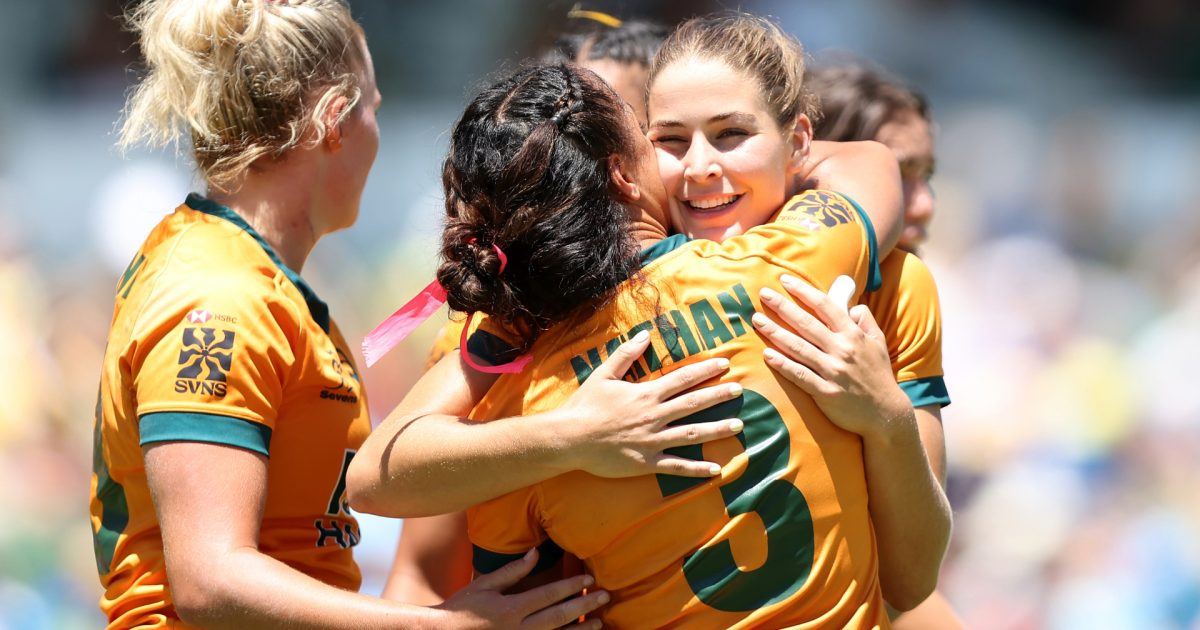Australia women and men chase history after making SVNS Perth finals

Both the Australian women’s and men’s sevens sides stand on the verge of greatness. Australia haven’t won the ‘double’ at a home event since the Sydney Sevens in 2018.
But the opportunity to forge their own legacies in an Olympic year awaits with both teams qualifying for the SVNS Perth final at HBF Park.
They may have slipped up in pool play with a surprising loss to Great Britain but there’s no denying the women in gold’s favouritism heading into the final on Sunday evening.
Australia ended New Zealand’s 41-game unbeaten streak to take out the SVNS Dubai final last month, and they backed that up with another win in Cape Town a week later.
But playing on home soil is another challenge altogether, but they’ve embraced it with both grace and poise, as well as a smile on their faces, on Australia’s west coast.
After beating rivals New Zealand in a thrilling quarter-final on Saturday afternoon, Australia shot out of the blocks on the final day with a 24-7 win over the United States of America.
“It’s awesome. Obviously our goal was to perform in front of our family and friends so to be able to get through to the grand final against the Irish, super exciting,” Australian Bella Nasser told reporters.
“We’re all really keen and now we have one more job to do. We’re all really excited.”
The road to the SVNS Perth Cup final hasn’t been without controversy. Australia had received two red cards in two events before this weekend, but more drama was on the way at home.
Rising star Teagan Levi was sent off against Great Britain late on Friday, and older sister Maddison was shown a red card less than 24 hours later against New Zealand.
Losing two of the from players from Dubai and Cape Town has been a challenge for the Aussies to overcome, but the “sisterhood” has responded with near-perfect execution on the field.
“We’ve lost two of our pretty key players. Both the Levi’s and (Bienne Terita) has gone down – yet to know what’s happened with her,” Nasser said.
“We’ve got a really good sisterhood within our team and we all step up when we need to.
“As long as we stick together and do our role, we all play a piece of the puzzle at the end of the day. A lot of people are stepping up to do the job of the Levi’s.
“We’re really excited for the final and we know it’s going to be hard work against the fighting Irish.”
Ireland stand in Australia’s way of their third Cup final win of the season. The Irish dispatched of Great Britain by an emphatic 31-7 scoreline on day three.
It’s only their second appearance in a Cup final, with their first coming at the Seville Sevens in the 2022 season.
“They’re a fighting team, we call them the fighting Irish. They’re so strong and very quick and agile.
“We know it will be a fight and we know they’ll come out really hard.
“We just have to stick tight in our sisterhood and keep working hard for each other.”
With the crowd still buzzing after the women’s sides’ win in their semi-final, the men’s team were met with a deafening cheer as they ran out onto the field at HBF Park.
Standing in Australia’s way of their second consecutive Cup final appearance was Fiji – a team they beat on their way to the SVNS Cape Town decider.
But, after a nervy start, the Aussies showed their class as Nick Malouf and Nathan Lawson crossed for tries. But the game was still very much up for grabs.
Leading by five points with a minute to play, captain Maurice Longbottom decided to chew the clock by taking a penalty shot at goal. That successful attempt stretch their lead out to eight.
“Yeah emotions are running high we’re on home soil so there’s always that added pressure of you have to do well. We didn’t start the tournament well, we were two and one,” Longbottom said.
“To be lucky enough to make it through to the grand final with this amazing crowd and family getting behind us, it’s outstanding.
“The slow the clock down. There was time on the clock,” he added when asked about the penalty goal.
The hosts deliver!
Australia men mirror the women’s success, reaching the #HSBCSVNSPER final 🇦🇺 #HSBCSVNS | @Aussie7s https://t.co/dCLQa8zMjr pic.twitter.com/bhvp8JAmiO
— HSBC SVNS (@SVNSSeries) January 28, 2024
“We were up by, I think it was eight when we kicked that field goal there.
“Slow the clock down, chew as much time out of that and then we just play footy.”
The men in gold will face SVNS Series leaders Argentina in their final. Los Pumas Sevens beat the Australians in the Cape Town final last month.
But the Australians are full of confidence – and they have a passionate crowd in their corner, too.
“There’s a reason they’re on top,” Longbottom discussed.
“They’re playing some outstanding footy and they have been all year.
“We’ve just got to be better in the air, we’ve got to be physical and we’ve got to get up for the fight and I’ve got no doubt we will.”

























































